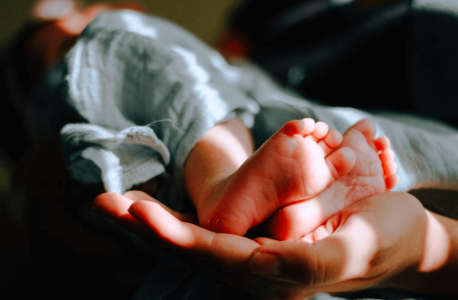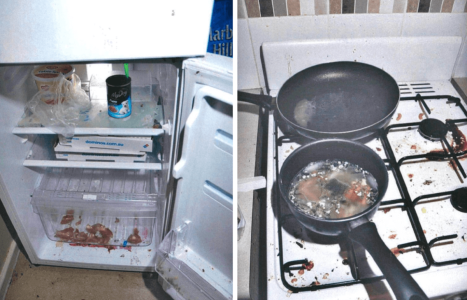Investigation into the death of an 11-week-old baby reveals heartbreaking details: 'It could have been prevented'
- Replies 23
Warning: This story contains distressing content.
We here at the Seniors Discount Club never like to bring our readers down with sad news, but sometimes important stories need to be told – even if they're difficult to read.
This is one of those stories.
An inquest into the death of an 11-week-old baby has concluded that the squalid living conditions he was subjected to likely played a role in his tragic passing.
In November 2018, the infant died while sleeping on a fold-out couch with his mother and two siblings in a home in rural South Australia. A post-mortem examination found that he had succumbed to a respiratory tract infection.
This is the first time the public has been made aware of this infant boy's death. The details only came out recently because the Department of Child Protection (DCP) won a bid to keep them suppressed, despite knowing about the death for four years.
The coroner only agreed to release them because he believed it would help prevent more tragedies like this one from happening again in the future.

During the inquest held to determine the circumstances leading up to the baby's death, it was revealed that there were many contributing factors at play.
It was heard that up until his death, the infant had been living in extremely dirty and cramped conditions, with little access to food or clean water.
The home was infested with cockroaches, and there were baby bottles containing putrid liquid, which appeared to be curdled milk. It was reported that there was also faeces in various parts of the house.
The stink of urine and faeces pervaded every room, and witnesses testified that it was incredibly difficult to breathe inside due to the overwhelming smell.
In addition, detectives investigating the case noted injuries on the baby's body which they believed were caused by him being squashed inside a bed frame. He also had marks stretching from his chin down to his shoulder - likely resulting from poor sleeping arrangements on overcrowded couches or beds.

The court also heard from Associate Professor Mike Starr, a paediatrician and infectious diseases physician.
According to the expert, the baby boy's death was not only caused by various infections that had been detected in his lungs after death; his sleeping arrangements were also a major factor in his untimely death.
'I believe [the baby's death] could have been prevented because there were a number of preventable factors,' he explained.
'If he had been put to bed in a cot, without anything in the cot, and it was an appropriate mattress, and the area was clean, and the mother didn't smoke, then this death would not have happened. They're all preventable things.'
Prior to the infant's death, Rachel Mayfield worked as the family's case manager for a non-profit organisation.
In testimony to the court, she claimed that during the one visit she made to the family's house, the mother informed her that she and her other two children had been sleeping on the fold-out couch.
'I guess it's not safe sleeping practice,' she said. 'I can't recall how I felt at the time, but I can comment that [after that visit], I have done safe infant sleep training and I'm more aware of the safety aspects of sleeping.'
Sadly, this information came too late for the infant in question.
Even though the incident in 2018 prompted her to take a one-time training course on safe sleeping practices for infants, Ms Mayfield later admitted she wished she had done so sooner so she could have informed the boy's mother.
'I would have had a conversation with her about safe sleeping practices and provided her with information about it,' she said.
Credit: 7NEWS Australia.
DCP was then notified and given the case.
The Department of Child Protection received 23 notifications about the household's living conditions and the well-being of the children, even prior to the baby's birth.
However, the department failed to take any meaningful action to improve the situation. In the end, their inaction led to the preventable death of an innocent baby.
The baby's mother was charged with and pleaded guilty to failing to provide adequate food, clothing, and accommodation for the baby and his siblings. She was given a good behaviour bond and the inquest heard she had made significant improvements since then.
The coroner has recommended that the Department of Child Protection conduct a review of its procedures in light of this tragedy to avoid any repeats in the future.

The sudden, unexpected death of a child is something no family should ever have to go through. It's a tragedy that can shatter lives and leave gaping holes in the hearts of those who loved the little one the most.
The details of this story are absolutely heartbreaking. We can only hope that this case will help bring about some much-needed change and that other families in similar situations will get the help they need before it's too late.
We here at the Seniors Discount Club never like to bring our readers down with sad news, but sometimes important stories need to be told – even if they're difficult to read.
This is one of those stories.
An inquest into the death of an 11-week-old baby has concluded that the squalid living conditions he was subjected to likely played a role in his tragic passing.
In November 2018, the infant died while sleeping on a fold-out couch with his mother and two siblings in a home in rural South Australia. A post-mortem examination found that he had succumbed to a respiratory tract infection.
This is the first time the public has been made aware of this infant boy's death. The details only came out recently because the Department of Child Protection (DCP) won a bid to keep them suppressed, despite knowing about the death for four years.
The coroner only agreed to release them because he believed it would help prevent more tragedies like this one from happening again in the future.

An 11-week-old baby died because of the filthy conditions inside his family's home. Credit: Unsplash/Omar Lopez.
During the inquest held to determine the circumstances leading up to the baby's death, it was revealed that there were many contributing factors at play.
It was heard that up until his death, the infant had been living in extremely dirty and cramped conditions, with little access to food or clean water.
The home was infested with cockroaches, and there were baby bottles containing putrid liquid, which appeared to be curdled milk. It was reported that there was also faeces in various parts of the house.
The stink of urine and faeces pervaded every room, and witnesses testified that it was incredibly difficult to breathe inside due to the overwhelming smell.
In addition, detectives investigating the case noted injuries on the baby's body which they believed were caused by him being squashed inside a bed frame. He also had marks stretching from his chin down to his shoulder - likely resulting from poor sleeping arrangements on overcrowded couches or beds.

Rubbish can be seen strewn all around the house in the photos, with several items lying on the ground or sitting atop the stove. Credit: SA Police.
The court also heard from Associate Professor Mike Starr, a paediatrician and infectious diseases physician.
According to the expert, the baby boy's death was not only caused by various infections that had been detected in his lungs after death; his sleeping arrangements were also a major factor in his untimely death.
'I believe [the baby's death] could have been prevented because there were a number of preventable factors,' he explained.
'If he had been put to bed in a cot, without anything in the cot, and it was an appropriate mattress, and the area was clean, and the mother didn't smoke, then this death would not have happened. They're all preventable things.'
Prior to the infant's death, Rachel Mayfield worked as the family's case manager for a non-profit organisation.
In testimony to the court, she claimed that during the one visit she made to the family's house, the mother informed her that she and her other two children had been sleeping on the fold-out couch.
'I guess it's not safe sleeping practice,' she said. 'I can't recall how I felt at the time, but I can comment that [after that visit], I have done safe infant sleep training and I'm more aware of the safety aspects of sleeping.'
Sadly, this information came too late for the infant in question.
Even though the incident in 2018 prompted her to take a one-time training course on safe sleeping practices for infants, Ms Mayfield later admitted she wished she had done so sooner so she could have informed the boy's mother.
'I would have had a conversation with her about safe sleeping practices and provided her with information about it,' she said.
Credit: 7NEWS Australia.
DCP was then notified and given the case.
The Department of Child Protection received 23 notifications about the household's living conditions and the well-being of the children, even prior to the baby's birth.
However, the department failed to take any meaningful action to improve the situation. In the end, their inaction led to the preventable death of an innocent baby.
The baby's mother was charged with and pleaded guilty to failing to provide adequate food, clothing, and accommodation for the baby and his siblings. She was given a good behaviour bond and the inquest heard she had made significant improvements since then.
The coroner has recommended that the Department of Child Protection conduct a review of its procedures in light of this tragedy to avoid any repeats in the future.
Key Takeaways
- An 11-week-old baby in rural South Australia died after sleeping on a fold-out couch in squalor with his mother and two siblings in 2018.
- A post-mortem examination found the child died of a respiratory tract infection. However, an expert told an inquest into his death that his sleeping environment was also a contributing factor.
- The Department of Child Protection (DCP) received 23 notifications concerning the household's living conditions between 2015 and 2018, and the inquest will investigate the agency's response leading up to the boy's death.
The sudden, unexpected death of a child is something no family should ever have to go through. It's a tragedy that can shatter lives and leave gaping holes in the hearts of those who loved the little one the most.
The details of this story are absolutely heartbreaking. We can only hope that this case will help bring about some much-needed change and that other families in similar situations will get the help they need before it's too late.







